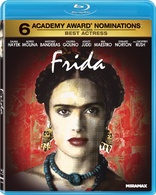Frida Blu-ray Movie
HomeFrida Blu-ray Movie 
Lionsgate Films | 2002 | 123 min | Rated R | Jan 31, 2012Movie rating
7.2 | / 10 |
Blu-ray rating
| Users | 4.5 | |
| Reviewer | 4.5 | |
| Overall | 4.5 |
Overview
Frida (2002)
"Frida" chronicles the life Frida Kahlo shared unflinchingly and openly with Diego Rivera, as the young couple took the art world by storm. From her complex and enduring relationship with her mentor and husband to her illicit and controversial affair with Leon Trotsky, to her provocative and romantic entanglements with women, Frida Kahlo lived a bold and uncompromising life as a political, artistic, and sexual revolutionary.
Starring: Salma Hayek, Alfred Molina, Valeria Golino, Mía Maestro, Roger ReesDirector: Julie Taymor
| Romance | Uncertain |
| Drama | Uncertain |
| Biography | Uncertain |
Specifications
Video
Video codec: MPEG-4 AVC
Video resolution: 1080p
Aspect ratio: 1.78:1
Original aspect ratio: 1.85:1
Audio
English: DTS-HD Master Audio 5.1 (48kHz, 24-bit)
Subtitles
English, English SDH, Spanish
Discs
50GB Blu-ray Disc
Single disc (1 BD)
Playback
Region A (locked)
Review
Rating summary
| Movie | 4.5 | |
| Video | 4.5 | |
| Audio | 4.5 | |
| Extras | 4.5 | |
| Overall | 4.5 |
Frida Blu-ray Movie Review
Portrait of a portrait artist.
Reviewed by Jeffrey Kauffman January 12, 2012How many directors can you name whose exploits have become fodder for Law and Order? Strike that: how many Broadway directors can you name who have that singular “honor”? If you’re having a hard time immediately coming up with one, don’t fret: there aren’t many. But one time wünderkind and latter day cause célèbre Julie Taymor saw a fictionalized (and criminalized) version of her trouble plagued helming of the gigantic and ill-fated Bono-The Edge musical Spider-Man: Turn Off the Dark make its way to air as an episode of Law and Order: Criminal Intent, where the mysterious death of an Icarus musical cast member was obviously modeled on the highly publicized injuries which occurred during Spider-Man: Turn Off the Dark’s preview period. Taymor first achieved widespread mainstream success with her Tony Award winning direction (and incredible costume designing) of the Broadway version of The Lion King. Audiences had never seen anything quite like the stunning visual prowess Taymor brought to the piece, a prowess that helped the audience overlook a less than masterpiece level score (despite its popular appeal) and book. The success of The Lion King made Taymor the directorial Flavor of the Week, and she soon found Hollywood’s doors open and coffers beckoning, and she made her first big screen outing (after a couple of widely temporally placed television outings) was Titus with Anthony Hopkins. Taymor seems to have a “thing” for classic drama and legendary and mythological characters (something the Law and Order “Icarus” alluded to), and so it was perhaps surprising that Taymor’s next feature film was the relatively “down to earth” biography of painter Frida Kahlo, Frida. Taymor’s reputation has been so sullied by the press surrounding the trials and tribulations of Spider-Man: Turn off the Dark that it’s become a bit harder in a way to maintain an objective viewpoint about her very real accomplishments in both theatrical and film idioms, but revisiting Frida now some ten years after its original release proves that Taymor, for all her perceived or real faults, is a director of unusual craft and visual flair. Neither the typical Hollywoodized hagiography nor the just as typical Hollywood scandalizing of its famous subject, Frida is a rather amazing work of art itself, one which blends a very distinctive visual style with some very effective storytelling which is supported by a host of commanding performances.
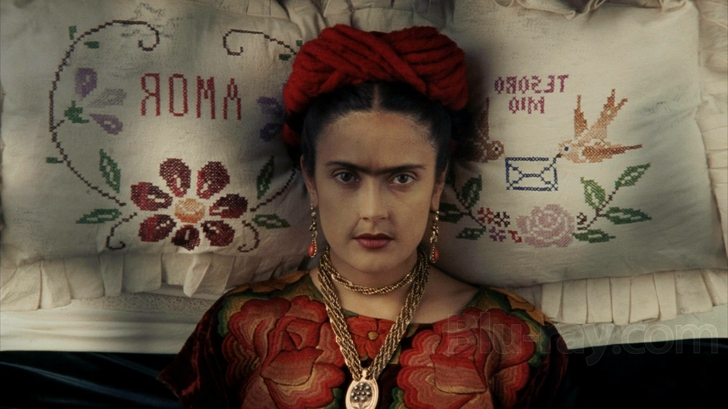
There’s little doubt that the film does occasionally wallow in Hollywood biographical clichés from time to time. Famous characters are introduced with sometimes almost humorously brief comments like “Look, there’s Leon Trotsky!” that may quickly allow the viewer to glean what’s going on, but which is kind of lazy filmic shorthand. (I'm actually kidding about this particular example, but Frida has several moments that are pretty close in tone if not in actual content). And some of the melodrama in Frida, especially with regard to her rocky marriage to Diego Rivera (Alfred Molina), seems to come right out of the ultra-glossy Golden Era where turgid, highly romanticized supposed biographies enveloped their subjects, whether it be anyone from Cole Porter (Night and Day) to Ruth Etting (Love Me or Leave Me) or in fact artists like Vincent Van Gogh (Lust for Life) with a thin coating of veneer which may have added sheen to the proceedings, but which also kept things at least occasionally artificial. (Lust for Life is probably the least guilty of that syndrome, and in fact Minnelli’s film seemed to be a profound transitional bridge from the “Old Hollywood” style of surface only biographies to a newer, more introspective approach which would soon take flower in the sixties and seventies with any number of productions, including films like John Huston’s Freud. The old guard wasn’t completely dead yet, though, as high gloss films like Harlow or Star!, both enormous flops incidentally, proved).
Taymor approaches her subject from an unusual, but rather effective, bifurcated approach that sacrifices nothing in terms of technical prowess (the film is awash in stunning visuals, with lots of sweeping crane shots and an almost hyperkinetic camera courtesy of DP Rodrigo Prieto) while at the same time not flinching from an up close and personal examination of Kahlo’s interior life, warts and all. The film suffers perhaps from the general public’s lack of real knowledge about its subject, and in fact for a lot of viewers anyway, it’s going to be some of the ostensible supporting characters, like Rivera or, yes, Trotsky who ring more instant bells. Who was Frida Kahlo and why was she so important to the world of Art? The film excels at answering the first question, but perhaps leaves the second question still lingering in the audience’s mind as it comes to a close. Frida is in fact almost more of a character study of a woman who just happens to paint, rather than of a painter who just happens to be a woman.
At the core of this film is the tempestuous marriage between Kahlo and Rivera, one that managed to survive (barely at times) mutual infidelities and a penchant on both of their parts to shoot from the hip, both verbally and emotionally, worrying about picking up the pieces later. This gives both Hayek (who received an Oscar nomination) and Molina (who really should have received a nomination as either Best Actor or Best Supporting Actor) the chance to really dig into their characters and deliver bristling, vibrant performances. Hayek (who weirdly resembles Ricki Lake with a monobrow throughout this film) is especially impressive evoking both Kahlo’s vulnerability (emotionally and physically, courtesy of a devastating injury which is depicted with pretty graphic imagery early in the film) as well as her grit and determination. While Molina is almost all bluster and bombast, as the film wends its way toward its conclusion, the layers of Rivera’s character are beautifully peeled back by Molina, allowing a glimpse of remorse that’s really very touching. There are a glut of fantastic supporting performances here, including Geoffrey Rush as Trotsky, and a number of big name actors in roles whose names may not ring a bell to those not acquainted with Mexican and/or early Communist ideology history. Among these stars are Antonio Banderas, Ashley Judd and Edward Norton as a character most American audiences will at least have heard of, Nelson Rockefeller.
Still and all, this is Taymor’s show, and frankly (and perhaps something that’s a bit of a surprise to those who have followed the recent Spider-Man brouhaha), she puts on a hell of a performance, restrained yet flashy, controlled yet free. With some really outré special effects sequences (at least within the usually staid confines of the biographical motion picture), including a couple of sequences that easily could have come out of a Tim Burton film, her Frida is full of little quirks like paintings dissolving into real life, or vice versa, art imitating life imitating art. The trip to New York sequence is just a riot of visual ingenuity, meshing a collage or Diego-esque mural quality with a funny parody of King Kong, and there are at least a handful of other unusual sequences that really establish this film as one of the most visually innovative biographical films ever made. While the importance of Kahlo the Artist probably isn’t given its due in this film, we get a surprisingly full bodied portrayal of Kahlo the Woman, and that helps to make Frida unforgettable.
Frida Blu-ray Movie, Video Quality 

Frida is presented on Blu-ray courtesy Lionsgate-Miramax with an AVC encoded 1080p transfer in 1.78:1. This is an astoundingly brilliant looking Blu-ray which benefits from Taymor's insistence that the film replicate the vivid palette of Kahlo's art. Frida is filled with incredibly deep and well saturated blues, reds, greens, purples and teals—a veritable kaleidoscope of bright, incredibly well saturated colors. Fine detail is exceptional throughout this presentation, so much so that Kahlo's famous monobrow (in the film's Oscar winning makeup) can be seen with each individual hair intact. The clarity and sharpness of this transfer is often breathtaking, with excellent contrast and lustrous black levels. There are one or two very minor issues with aliasing and negligible shimmer on patterned elements like a shawl Kahlo wears, but otherwise this is certainly one of the best looking of the recent Lionsgate-Miramax catalog releases and should easily satisfy the film's fans.
Frida Blu-ray Movie, Audio Quality 
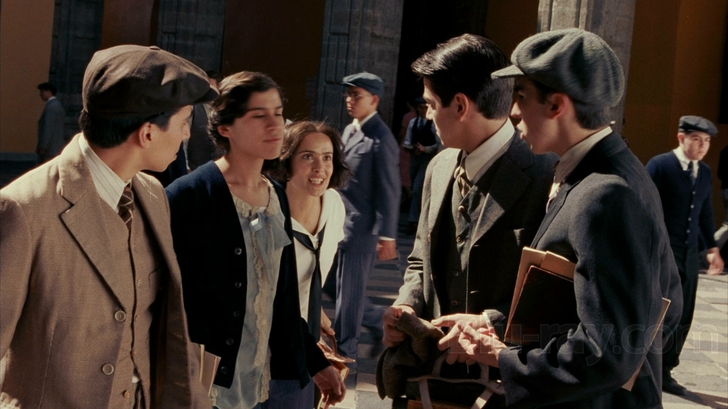
Frida's lossless DTS-HD Master Audio 5.1 audio is a surprisingly full bodied soundtrack for what amounts to basically a dialogue driven character study. Part of the track's appeal is the gorgeous music from Elliot Goldenthal, which won a well-deserved Oscar, and which incorporates a lot of ethnic Mexican music, all of which sounds spectacular in lossless audio. But even the non-music elements are given some nice chances to shine, and the film's more fantasy laden elements open up the soundfield considerably and allow for more immersion than is usually the case with this type of film. The horrible streetcar accident which occurs early in the film also has some really brilliant sound design which envelops the listener completely. Dialogue is very well prioritized (though Ashley Judd's Mexican "accent" sounds notably phony when thrust up next to Hayek's). This may not be an over the top bombastic sort of summer blockbuster soundtrack, but it's really amazingly robust for this type of film, and considering the DTS track's awesome fidelity and dynamic range, helps to establish the film's mood very, very well.
Frida Blu-ray Movie, Special Features and Extras 
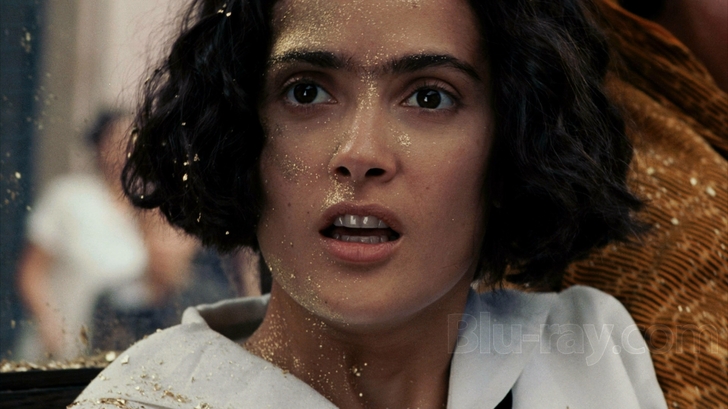
- Commentary with Julie Taymor Color me surprised, but Taymor comes off as really rather low key and collaborative in this commentary, completely at odds with the megalomania she's been portrayed as having with regard to the Spider-Man musical. She splits her time fairly evenly between various technical details and more anecdotal information about the shoot. A very enjoyable commentary all around.
- A Conversation with Salma Hayek (SD; 38:20) talks about her long desire to portray Kahlo, and how the film morphed from her original, smaller conception into the grander enterprise it ended up being.
- American Film Institute Q&A with Julie Taymor (SD; 30:15) is from October 2, 2002, hosted by Dezso Magyar.
- Bill Moyers Interview With Julie Taymor (SD; 19:12) is from Moyers' Now series.
- Chavela Vargas Interview (SD; 15:44) is a nice sit down with the vocalist who contributed to the Frida score.
- The Voice of Lila Downs (SD; 5:22) is another piece concentrating on one of the film's vocalists.
- The Vision of Frida: With Rodrigo Prieto and Julie Taymor (SD; 6:08) highlights the expressive cinematography of Frida.
- The Design of Frida: With Felipe Fernández (SD; 2:27) is a brief portrait of the film's production designer.
- The Music of Frida: With Elliot Goldenthal and Salma Hayek (SD; 4:57) is a quick look at Goldenthal and his Oscar winning contribution to the film.
- Salma's Recording Session (SD; 2:38) has footage of and commentary about the re-recording session of Salma's big song for the CD release of the score. Salma actually sang live for the actual film, but Taymor didn't like the sound quality.
- Bringing Frida Kahlo's Life and Art to Film: A Walk Through the Real Locations (SD; 5:19) is another look at the film's production design, as well as some of the locations the film utilized.
- Portrait of an Artist (SD; 14:10) is a longer form promo piece that plays like an extended trailer.
- "Amoeba Proteus" Visual FX Piece (SD; 9:23) looks at this team's assembling of the film's inventive FX sequences.
- "The Brothers Quay" Visual FX Piece (SD; 1:32) concentrates on The Day of the Dead FX sequence after Kahlo is seriously injured and is in a quasi-delusional state.
Frida Blu-ray Movie, Overall Score and Recommendation 
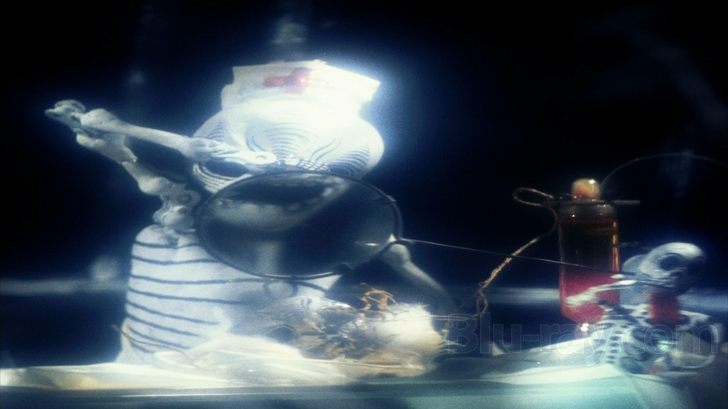
Frida is an absolutely gorgeous film and certainly is proof positive that there's something to Taymor beyond mere hype. The performances here are top notch, and the entire film is fascinating and heartfelt. What some might pine for is more information about Kahlo. We get a lot of sturm und drang with regard to her rocky relationship with Rivera, but we're left with precious little knowledge about her contributions to the art world. Even with that caveat, this Blu-ray looks and sounds stupendous and comes with a bountiful supply of extras, and so is Highly recommended.
Similar titles
Similar titles you might also like

Freeheld
2015

Beloved Infidel
Limited Edition to 3000 - SOLD OUT
1959

The Way We Were 4K
50th Anniversary
1973

Mao's Last Dancer
2009

Millie
1931

Last Night
2010

Hemingway & Gellhorn
2012

The Facts of Life
1960

Beyond the Lights
2014

The Private Lives of Elizabeth and Essex
Warner Archive Collection
1939

Belle
2013

Hold Back the Dawn
Arrow Academy
1941

The Jane Austen Book Club
2007

The Bridges of Madison County
1995

Like Water for Chocolate
Como agua para chocolate
1992

Intermezzo: A Love Story
1939

The Duchess
2008

Bel Ami
2012

Girl with a Pearl Earring
2003

Diana
2013
